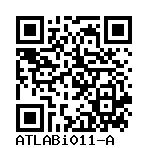AT-MODY10-iII4
ATLABi011-A
General
Cell Line |
|
| hPSCreg name | ATLABi011-A |
| Cite as: | ATLABi011-A |
| Alternative name(s) |
AT-MODY10-iII4
|
| Cell line type | Human induced pluripotent stem cell (hiPSC) |
| Similar lines |
ATLABi012-A (AT-M10 Normal-iI2) ATLABi013-A (AT-M10 Normal-iII3) LUMCi027-A (LUMC0153iPKP03) Donor's gene variants: PKP2 Donor diseases: arrhythmogenic right ventricular dysplasia 9 ATLABi001-A (AT-MODY3-iP001) Donor diseases: Hepatocyte Nuclear Factor 1-Alpha-Associated Monogenic Diabetes ATLABi002-A (AT-MODY3-iP002) Donor diseases: Hepatocyte Nuclear Factor 1-Alpha-Associated Monogenic Diabetes TAUi006-A (UTA.00102.LQT1) Donor's gene variants: KCNQ1 – potassium voltage-gated channel subfamily Q member 1 Donor diseases: Long QT Syndrome 1 TAUi006-B (UTA.00118.LQT1) Donor's gene variants: KCNQ1 – potassium voltage-gated channel subfamily Q member 1 Donor diseases: Long QT Syndrome 1 TAUi007-A (UTA.00208.LQT1) Donor's gene variants: KCNQ1 – potassium voltage-gated channel subfamily Q member 1 Donor diseases: Long QT Syndrome 1 TAUi007-B (UTA.00211.LQT1) Donor's gene variants: KCNQ1 – potassium voltage-gated channel subfamily Q member 1 Donor diseases: Long QT Syndrome 1 |
| Last update | 30th September 2021 |
| User feedback | |
Provider |
|
| Generator |
IMCB, Adrian Teo's Lab (ATLAB)
Contact:
IMCB, Adrian Teo's Lab (ATLAB) |
| Owner | IMCB, Adrian Teo's Lab (ATLAB) |
| Distributors | |
| Derivation country | Singapore |
External Databases |
|
| BioSamples | SAMEA9726680 |
General Information |
|
| * Is the cell line readily obtainable for third parties? |
Yes Research use: allowed
Clinical use: not allowed
Commercial use: allowed
|
Donor Information
General Donor Information |
|
| Sex | female |
| Age of donor (at collection) | 20-24 |
| Ethnicity | Asian Chinese |
Phenotype and Disease related information (Donor) |
|
| Diseases | A disease was diagnosed.
|
Karyotyping (Donor) |
|
| Has the donor karyotype been analysed? |
Yes
46, XX
Karyotyping method:
G-Banding
|
Other Genotyping (Donor) |
|
| Is there genome-wide genotyping or functional data available? |
No
|
Donor Relations |
|
| All cell lines of this donor's relatives |
Has brother:
Has mother:
Has brother:
Has father:
|
External Databases (Donor) |
|
| BioSamples | SAMEA10202004 |
Ethics
| Has informed consent been obtained from the donor of the embryo/tissue from which the pluripotent stem cells have been derived? | Yes |
| Was the consent voluntarily given? | Yes |
| Has the donor been informed that participation will not directly influence their personal treatment? | Yes |
| Can you provide us with a copy of the Donor Information Sheet provided to the donor? | No |
| Do you (Depositor/Provider) hold the original Donor Consent Form? | No |
| If you do not hold the Donor Consent Form, do you know who does? | Yes |
| Alternatives to consent are available? | No |
| Confirm that consent was obtained by a qualified professional | Yes |
| Has the donor been informed about how her/his data will be protected? | Yes |
| Please indicate whether the data associated with the donated material has been pseudonymised or anonymised. | pseudonymised |
| Does consent explicitly allow the derivation of pluripotent stem cells? | Yes |
| Does consent prevent CELLS DERIVED FROM THE DONATED BIOSAMPLE from being made available to researchers anywhere in the world? | No |
| How may genetic information associated with the cell line be accessed? | Controlled Access |
| Will the donor expect to receive financial benefit, beyond reasonable expenses, in return for donating the biosample? | No |
| Has a favourable opinion been obtained from a research ethics committee, or other ethics review panel, in relation to the Research Protocol including the consent provisions? | Yes |
| Name of accrediting authority involved? | CIRB |
| Approval number | 2015/2003 |
| Do you have obligations to third parties in regard to the use of the cell line? | Yes |
| Please describe: | In consultation with clinician collaborator |
| For generation of the cell line, who was the supplier of any recombined DNA vectors or commercial kits used? |
hIPSC Derivation
General |
|
| Source cell type | |
| Age of donor (at collection) | 20-24 |
Reprogramming method |
|
| Vector type | Non-integrating |
| Vector | Episomal |
Vector free reprogramming |
|
| Type of used vector free reprogramming factor(s) |
None
|
Other |
|
| Derived under xeno-free conditions |
Unknown |
| Derived under GMP? |
No |
| Available as clinical grade? |
No |
Culture Conditions
| Feeder cells |
Irradiated CF-1 mouse embryonic fibroblasts |
|||||||||||||||
| Passage method | Mechanically | |||||||||||||||
| CO2 Concentration | 5 % | |||||||||||||||
| Medium |
Other medium:
Base medium: DMEM/F-12
Main protein source: Knock-out serum replacement Serum concentration: 20 % Supplements
|
|||||||||||||||
| Has Rock inhibitor (Y27632) been used at passage previously with this cell line? | Unknown |
|||||||||||||||
| Has Rock inhibitor (Y27632) been used at cryo previously with this cell line? | No |
|||||||||||||||
| Has Rock inhibitor (Y27632) been used at thaw previously with this cell line? | Unknown |
Characterisation
Analysis of Undifferentiated Cells
| Marker | Expressed | Immunostaining | RT-PCR | Flow Cytometry | Enzymatic Assay | Expression Profiles |
| POU5F1 (OCT-4) |
Yes |
|||||
| SOX2 |
Yes |
|||||
| NANOG |
Yes |
| Marker | Present | Absent |
| mCpG | ||
| OCT4 |
Differentiation Potency
Genotyping
Karyotyping (Cell Line) |
|
| Has the cell line karyotype been analysed? |
Yes
46, XX
Karyotyping method:
G-Banding
|
Other Genotyping (Cell Line) |
|


Login to share your feedback, experiences or results with the research community.